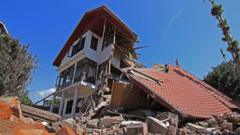In the wake of an unprecedented attack that left 26 dead, India ramps up security measures, bringing tensions between India and Pakistan back to the forefront.
**India Intensifies Search for Perpetrators Following Pahalgam Attack**

**India Intensifies Search for Perpetrators Following Pahalgam Attack**
Authorities in Kashmir respond to deadly attack by demolishing suspected militants' homes and detaining individuals for questioning.
Authorities in Indian-administered Kashmir have stepped up their investigation into the tragic killings of 26 individuals following a deadly attack on tourists in Pahalgam. In a series of controversial actions, Indian security forces have demolished the homes of at least ten alleged militants thought to be connected to the incident. These demolitions were executed using explosives since the tragedy unfolded last Tuesday.
With the attack marking the deadliest civilian assault in Kashmir in over 20 years, India has accused Pakistan of backing the militants responsible, although it has not identified any specific group. Pakistan has dismissed these allegations, leading to heightened tensions in the region, which both India and Pakistan claim and have contested through decades of conflict.
The Indian authorities also intensified searches throughout Kashmir, with over 1,500 individuals detained for questioning in connection to the attack. Reports indicate that the demolished houses belonged to families of individuals suspected of militant activity or those who may have crossed into Pakistan. Despite the ongoing operations, local leaders in Kashmir have voiced concerns regarding these demolitions. Jammu and Kashmir’s Chief Minister Omar Abdullah emphasized the need to punish the guilty while ensuring that innocents do not suffer collateral damage.
Former Chief Minister Mehbooba Mufti echoed this sentiment, urging the government to differentiate between terrorists and civilians. Last November, the Indian Supreme Court had previously banned what is known as "bulldozer justice," a controversial approach that has gained notoriety in recent years.
In the aftermath of the attack, reports have emerged of harassment against Kashmiri students studying in various parts of India, highlighting a climate of fear that has enveloped the region. Moreover, Indian police have named three individuals linked to the attack, which specifically targeted Hindu men, further inflaming communal tensions.
Prime Minister Narendra Modi has publicly declared a nationwide effort to track down those responsible, promising severe consequences for the attackers. The incident has exacerbated already strained relations between India and Pakistan. Following the attack, India suspended the 1960 Indus Waters Treaty, a pivotal water-sharing agreement, while Pakistan retaliated by suspending a key bilateral accord from 1972 aimed at peaceful dispute resolution.
Each side has engaged in diplomatic expulsions and tightened visa restrictions, leading to significant disruptions in cross-border relations. Modi stated that the attack aimed to disrupt the returning peace in Jammu and Kashmir, suggesting deeper motives behind the assault. Meanwhile, international officials, including the US State Department, have urged India and Pakistan to seek a diplomatic resolution to the escalating conflict.
As the situation develops, the global community continues to monitor potential repercussions arising from this tragic event in a region fraught with historical animosities.
With the attack marking the deadliest civilian assault in Kashmir in over 20 years, India has accused Pakistan of backing the militants responsible, although it has not identified any specific group. Pakistan has dismissed these allegations, leading to heightened tensions in the region, which both India and Pakistan claim and have contested through decades of conflict.
The Indian authorities also intensified searches throughout Kashmir, with over 1,500 individuals detained for questioning in connection to the attack. Reports indicate that the demolished houses belonged to families of individuals suspected of militant activity or those who may have crossed into Pakistan. Despite the ongoing operations, local leaders in Kashmir have voiced concerns regarding these demolitions. Jammu and Kashmir’s Chief Minister Omar Abdullah emphasized the need to punish the guilty while ensuring that innocents do not suffer collateral damage.
Former Chief Minister Mehbooba Mufti echoed this sentiment, urging the government to differentiate between terrorists and civilians. Last November, the Indian Supreme Court had previously banned what is known as "bulldozer justice," a controversial approach that has gained notoriety in recent years.
In the aftermath of the attack, reports have emerged of harassment against Kashmiri students studying in various parts of India, highlighting a climate of fear that has enveloped the region. Moreover, Indian police have named three individuals linked to the attack, which specifically targeted Hindu men, further inflaming communal tensions.
Prime Minister Narendra Modi has publicly declared a nationwide effort to track down those responsible, promising severe consequences for the attackers. The incident has exacerbated already strained relations between India and Pakistan. Following the attack, India suspended the 1960 Indus Waters Treaty, a pivotal water-sharing agreement, while Pakistan retaliated by suspending a key bilateral accord from 1972 aimed at peaceful dispute resolution.
Each side has engaged in diplomatic expulsions and tightened visa restrictions, leading to significant disruptions in cross-border relations. Modi stated that the attack aimed to disrupt the returning peace in Jammu and Kashmir, suggesting deeper motives behind the assault. Meanwhile, international officials, including the US State Department, have urged India and Pakistan to seek a diplomatic resolution to the escalating conflict.
As the situation develops, the global community continues to monitor potential repercussions arising from this tragic event in a region fraught with historical animosities.






















